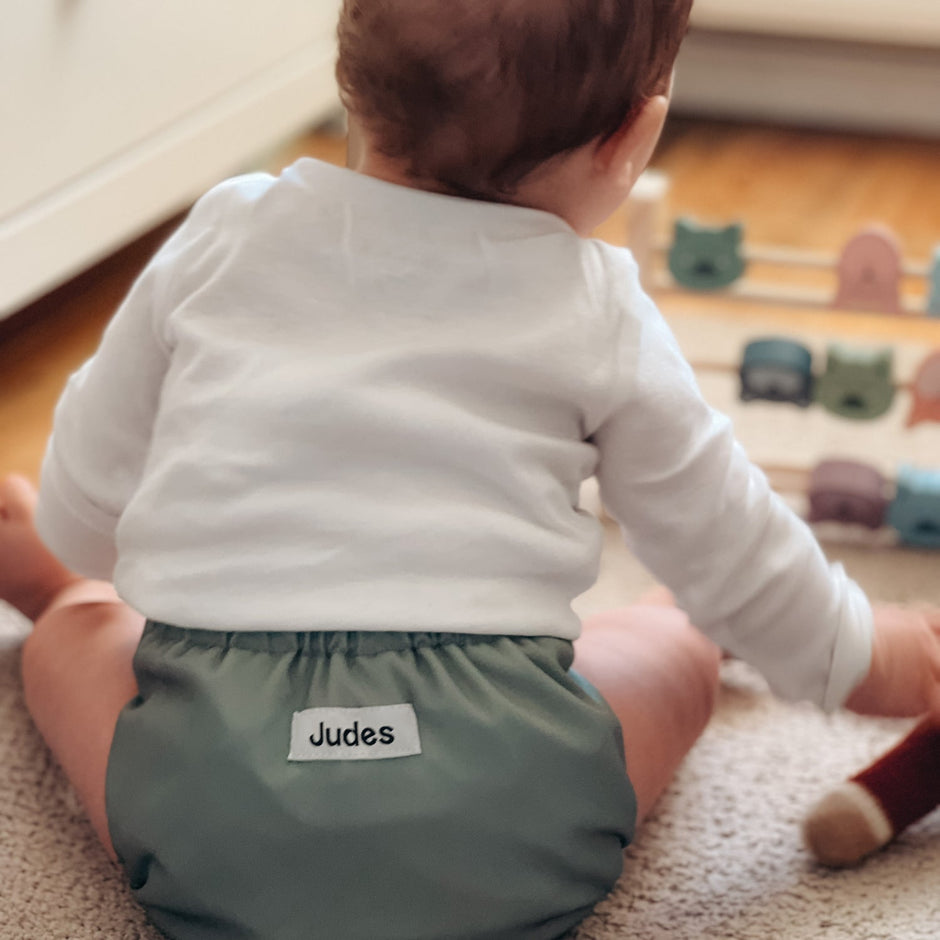Green Baby Poop: What the Color of a Diaper's Contents Reveals
Updated on:
Photo by @antonia_natascha
When it comes to babies, it’s important to pay attention to every little detail – including the color of their stool. What’s in your baby’s diaper can give parents valuable clues about their child’s health and wellbeing. Green stool in babies is usually harmless, but it often raises questions for parents. In this article, we'll take a look at what green poop means in newborns and when it might be a cause for concern.
What does green stool mean in babies? Green stool in babies can have various causes and is harmless in many cases. Right after birth, it’s common in babies to pass a green-black, sticky substance known as meconium. This usually changes in the first few days of life. Green stool in older babies can be linked to different causes, such as their diet (breastfeeding or formula feeding), the introduction of solid foods, or possibly a mild irregularity in digestion.
The color of a baby’s poop isn’t always a cause for concern. It should be considered alongside other symptoms and behaviors to make an accurate assessment.
Stool Color Checker for Your Baby
Unsure about analyzing your baby's diaper? Select age, color, and symptoms to get an initial assessment. This check does not replace professional medical advice.
Is green stool in babies harmless?
Green stool in babies is a common phenomenon and is not a cause for concern in most cases. It’s important to understand that your baby's stool, especially in the first months of life, can change greatly in color and consistency. This is a normal part of their development.
In many cases, green stool is simply a sign that your baby is adapting to feeding and digestion. This can be especially observed in newborns as their digestive system shifts from processing meconium to digesting regular food. Changes in stool color can also occur when switching from breast milk to formula or when introducing solid foods.
However, green stool can also be a sign of certain illnesses, such as food intolerances or infections. If, alongside green stool, symptoms like fever, vomiting, lethargy or irritability appear, it is important to see a pediatrician for a thorough examination.
Usually, green stool in babies is harmless and a part of their natural development process.

Photo by @isabelplett
What does green stool mean in babies and children?
In the first days of a newborn’s life, green to black stool, known as meconium, is completely normal and a sign of health. Meconium is a viscous substance that accumulates in the baby's intestines during pregnancy. A few days after birth, the baby's stool changes from meconium to a yellowish, less viscous consistency, which is a sign of the normal development of the digestive system.
Green stool in formula-fed and breastfed babies
In older babies, stool color can vary depending on their diet. In breastfed babies, green stool may be a sign that the baby is getting too much foremilk (the watery milk that comes at the beginning of a feeding) and not enough fatty hindmilk. This can happen when a baby feeds frequently but only briefly on each breast.
In formula-fed babies, green stool can indicate the composition of the formula or intolerance to certain ingredients. Some babies also react to the iron content in formula with green stool.
In both cases, green stool is usually not a cause for concern as long as the baby is gaining weight normally, is active, and has no other symptoms. Nevertheless, it may be helpful to speak with a pediatrician to ensure the baby is optimally nourished.
Another reason for green stool, aside from possible infections, can be teething. As soon as the teeth start to break through the gums, this can affect both saliva production and stool.
Other causes of green stool
The introduction of solid foods is an important step in a baby's development and can also cause changes in their stool. Green stool can be a natural reaction to certain foods, mainly to green vegetables such as spinach or broccoli. This color change is usually harmless and should not be seen as a problem. However, it's important to pay attention to your baby's overall wellbeing and make sure they have a balanced diet.
Medications and supplements
Certain medications and supplements, taken either by the baby or the breastfeeding mother, can also cause a change in stool color. For example, taking iron supplements can lead to green stool in both mothers and babies. Certain vitamins and probiotics can have similar effects. If a baby's stool changes after taking medications or supplements, it's important to discuss this with your pediatrician. This way, you can ensure that no unwanted side effects occur.
Can green stool in babies be prevented?
Whether prevention of green stool in babies is necessary depends on the cause and the accompanying circumstances. Since green stool is often a harmless and temporary phenomenon, specific prevention is usually not required. Instead, the focus should be on the general health and well-being of the baby.
Some measures that can help promote a normal stool color include:
- Balanced nutrition for breastfed babies: Mothers should make sure that the baby receives both foremilk and the fattier hindmilk during breastfeeding. This can be achieved by feeding longer on each breast.
- Adjusted formula: For formula-fed babies, an adjustment of the formula may be advisable in consultation with a pediatrician if it is suspected that the green stool is caused by an intolerance or allergy.
- Careful introduction of solid foods: When introducing new foods, proceed gradually to observe how the baby reacts to various foods.
- Monitoring medications and supplements: Both for the breastfeeding mother and the baby, the impact of medications and supplements on bowel movements should be observed.
It is important to remember that variations in stool color are normal for babies, especially during growth and developmental phases. As long as the baby is healthy and developing normally, there is usually no need to worry about occasional green stool. Always trust your instincts and natural intuition in these situations.

Photo by @cafema.illustration
Can green stool be dangerous?
Although green stool in babies is usually harmless, there are certain circumstances in which it may indicate health problems. It is important to watch for additional symptoms that may occur together with green stool. This will help you to assess whether you should seek a doctor's opinion.
Green stool could be a sign of a problem in the following cases:
- Accompanying symptoms: If the green stool is accompanied by other signs such as fever, vomiting, diarrhea, lethargy, or irritability. This could indicate an infection or another health disorder.
- Persistent change: If green stool persists over a longer period without an apparent reason, it is advisable to have it examined by a pediatrician.
- Blood in stool: The presence of blood in the stool is a sign that should always be checked by a physician.
- Allergic reactions: In babies who are allergic to certain foods or ingredients in milk formula, green stool can be one of the symptoms.
In most cases, green stool is no cause for concern and can be explained by natural changes in the baby's diet and development. It is always a good idea to consult a pediatrician in cases of uncertainty or if your baby shows signs of discomfort.
Baby's Stool – what does normal look like?
There are significant differences in a baby's stool compared to that of adults. These differences cover both color and consistency. It is normal for babies to display a wide variety of stool types throughout their development. Variations often depend on their diet and stage of development.
Here is an overview table showing what different colors and consistencies of baby stool can mean:
|
Stool color |
Consistency |
Possible meaning |
|
Yellow |
Soft, mushy |
Normal in breastfed babies |
|
Green |
Variable |
Normal with dietary changes, foremilk, solid foods |
|
Brown |
Soft to firm |
Normal with formula feeding and older babies |
|
Black |
Tar-like |
Normal in the first days of life (meconium) |
|
White or gray |
Firm or clay-like |
May indicate digestive problems, medical consultation recommended |
|
Red or bloody |
Variable |
May indicate injury or allergy, medical consultation required |
It is important to note that this overview only serves as a general guide. For questions or concerns regarding your baby's stool, you should always consult a pediatrician. Changes in stool color and consistency can be normal, but when it comes to your baby's health, it's best to play it safe.
Judes Cloth Diapers: The ideal solution for every diaper content
After looking at the various aspects of stool in babies, it becomes clear how important a reliable and practical diapering solution is. This is where the innovative cloth diapers from Judes come into play.
Judes cloth diapers are designed to be not only eco-friendly and gentle on delicate baby skin, but also to meet the needs of modern parents. Our diapers are easy to use, which is especially helpful when dealing with different types of stool. Thanks to their high absorbency and leak protection, our cloth diapers offer optimal comfort and protection – whether your baby’s stool is liquid, solid, brown, yellow, or green.
Why Judes is the best choice for your baby:
At Judes, we know that parents want the best for their children – and that includes a diaper that is as straightforward as it is effective. Our innovative cloth diapers offer a range of benefits to make everyday life easier and more sustainable:
- Easy to use: Our cloth diapers are just as simple to use as disposable diapers. No complicated folding, no fiddly washing – just put on, use, wash, and reuse.
- Quick cleaning: With the practical Poo Paper, stool can be easily and hygienically disposed of in the toilet, without ending up in the washing machine.
- High absorbency and leak protection: Thanks to their smart design, Judes diapers provide reliable protection, whether your baby has solid or liquid stool.
- Gentle on the skin: Our diapers are made from soft, skin-friendly materials that ensure maximum comfort even for sensitive baby skin.
- Sustainable and environmentally friendly: With Judes, you actively help reduce waste and protect our environment for future generations.
- Early potty training: The natural materials in Judes allow children to feel when they relieve themselves, which helps them understand their bodily processes earlier. In disposable diapers, by contrast, children always feel dry, which delays this developmental step.
By choosing Judes, you are choosing a diaper that supports your baby's health and at the same time helps create a better world for future generations. Try Judes with our cloth diaper trial pack and choose a solution that benefits both your baby and the environment.

